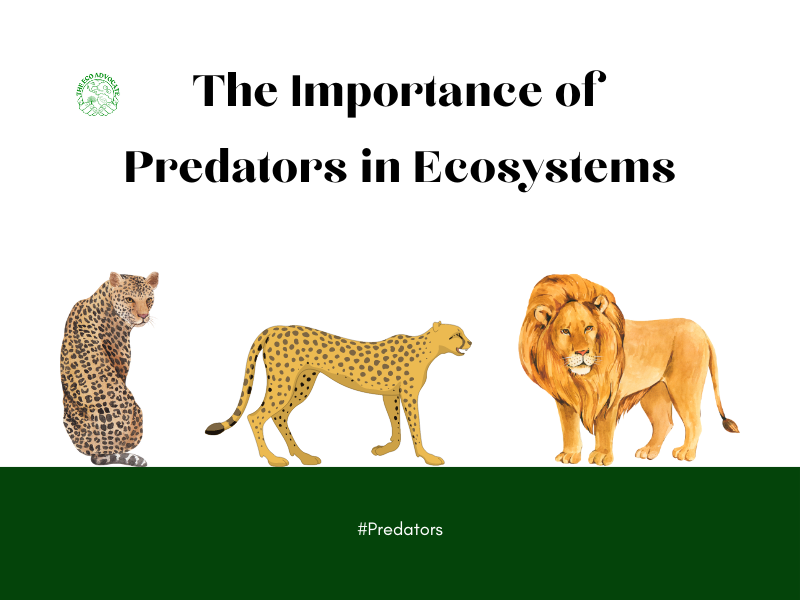Predators play a crucial role in maintaining the health and balance of ecosystems. From controlling prey populations to influencing the behaviour of other species, predators are essential for biodiversity and ecological stability. In Africa, and specifically Kenya, the presence of predators like lions, leopards, and cheetahs has profound effects on the environment and its inhabitants.
UNDERSTANDING THE ROLE OF PREDATORS
Population Control
Predators help regulate the populations of their prey. By preying on the weak, sick, or old individuals, they ensure that only the healthiest members of the prey population survive and reproduce. This natural selection process helps maintain a healthy gene pool and prevents overpopulation, which can lead to resource depletion and habitat destruction.
Maintaining Biodiversity
Predators help maintain biodiversity by keeping prey populations in check, preventing any single species from dominating the ecosystem. This allows a variety of species to coexist, promoting a more diverse and resilient environment. In Kenya, the presence of apex predators like lions in Maasai Mara ensures a balanced population of herbivores such as zebras, wildebeests, and antelopes.
THE RIPPLE EFFECT OF PREDATORS
Influencing Prey Behavior
The presence of predators can alter the behaviour of prey species. For example, in areas where predators are abundant, prey animals may change their grazing patterns to avoid predation. This behavioural shift can have significant effects on vegetation and the overall landscape.
Supporting Plant Communities
By controlling herbivore populations, predators indirectly support plant communities. In Kenya’s Amboseli National Park, the presence of predators like lions and hyenas helps prevent overgrazing by herbivores, allowing vegetation to thrive. This, in turn, supports a variety of other species, from insects to birds, creating a more vibrant and diverse ecosystem.
CASE STUDIES: PREDATORS IN KENYA
The Lion
Lions are one of Africa’s most iconic predators. In Kenya, they are found in several national parks and reserves, including Maasai Mara, Tsavo, and Amboseli. Lions play a critical role in controlling herbivore populations, which helps maintain the balance of the ecosystem. Their presence ensures that species like wildebeests and zebras do not become overly abundant, which would otherwise lead to overgrazing and habitat degradation.
The Cheetah
Cheetahs, known for their incredible speed, are also important predators in Kenya. They primarily hunt smaller ungulates such as gazelles and impalas. Cheetahs help maintain the health of these prey populations by targeting the weakest individuals, thereby promoting genetic diversity and resilience. The presence of cheetahs in ecosystems like the Maasai Mara and Samburu also influences the behavior of other predators and scavengers, creating a complex web of interactions that supports ecological balance.
The Leopard
Leopards are solitary and elusive predators that are found in various habitats across Kenya, from savannas to forests. They are highly adaptable and play a crucial role in controlling the populations of smaller mammals and birds. Leopards’ hunting habits help maintain the diversity of prey species and prevent any single species from becoming too dominant.
THE CHALLENGES FACING PREDATORS
Habitat Loss
One of the biggest threats to predators in Kenya is habitat loss. As human populations grow and expand into wildlife areas, natural habitats are fragmented and reduced. This makes it difficult for predators to find sufficient prey and territory, leading to conflicts with humans.
Human-Wildlife Conflict
As predators lose their natural habitats, they may come into closer contact with human populations, leading to conflicts. Livestock predation by lions and leopards is a significant issue in many parts of Kenya. This not only threatens the livelihoods of local communities but also leads to retaliatory killings of these important predators.
Poaching and Illegal Wildlife Trade
Poaching and illegal wildlife trade pose significant threats to predator populations. Lions and other big cats are often targeted for their body parts, which are used in traditional medicine and as trophies. Despite efforts to combat poaching, illegal activities continue to threaten the survival of these species.
CONSERVATION EFFORTS
Protected Areas
Establishing and maintaining protected areas like national parks and reserves is crucial for the conservation of predators. These areas provide safe habitats where predators can hunt and reproduce without the pressures of human encroachment. In Kenya, parks like Maasai Mara and Amboseli play a vital role in preserving predator populations.
Community Involvement
Engaging local communities in conservation efforts is essential for the success of predator conservation. Initiatives that provide economic benefits to communities, such as eco-tourism, can help reduce human-wildlife conflicts and promote coexistence. Programs that educate and involve communities in monitoring and protecting predators are also important for long-term conservation.
Anti-Poaching Measures
Strengthening anti-poaching measures and law enforcement is critical for protecting predators from illegal activities. This includes increasing patrols, using technology like drones and camera traps, and implementing stricter penalties for poachers. Collaboration between governments, conservation organizations, and local communities is necessary to effectively combat poaching.
CONCLUSION
Predators are vital components of ecosystems, playing a key role in maintaining ecological balance and biodiversity.
In Kenya, predators like lions, cheetahs, and leopards are essential for the health of natural habitats and the species that inhabit them. However, these predators face significant challenges, including habitat loss, human-wildlife conflict, and poaching. Conservation efforts that involve protected areas, community engagement, and anti-poaching measures are crucial for ensuring the survival of these magnificent animals. By understanding and appreciating the importance of predators, we can work towards a future where they continue to thrive and contribute to the health of our ecosystems.

